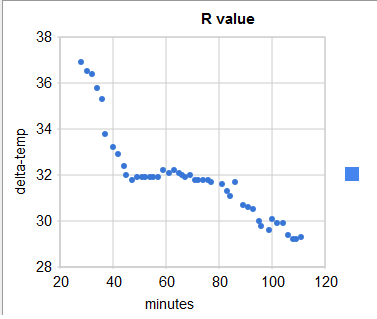Household R value: Difference between revisions
Appearance
created from notes left by Cellurl on projects talk page |
→Overview: added link to wikipedia article |
||
| Line 21: | Line 21: | ||
== Overview == | == Overview == | ||
The R Value of a house is a measurement of the thermal resistance of a house. In other words it is a means of measuring how well the house is insulated. This provides a means of reference for how well the house resists changing its internal temperature based on the outside temperature. | The R Value of a house is a measurement of the thermal resistance of a house. In other words it is a means of measuring how well the house is insulated. This provides a means of reference for how well the house resists changing its internal temperature based on the outside temperature. So I took an attempt at "measuring our house". My side kick Carter and I did an experiment. | ||
{{see wikipedia|R-value (insulation)}} | |||
== Facts == | == Facts == | ||
Latest revision as of 00:10, 5 March 2010
| Household R Value | |
|---|---|
| Information | |
| Owner | Cellurl |
| Started On | 2010-02-17 |
| Time | 120 minutes |
Overview
The R Value of a house is a measurement of the thermal resistance of a house. In other words it is a means of measuring how well the house is insulated. This provides a means of reference for how well the house resists changing its internal temperature based on the outside temperature. So I took an attempt at "measuring our house". My side kick Carter and I did an experiment.
See Wikipedia for more details on Household R value.
Facts
- No one can tell if their house leaks like a sieve.
People sell window replacements by the boatload due to fact #1.
Process
- Made sure it was cloudy and reasonably constant temperature outside.
- We ran the heat up to 70 ℉ (21.1 ℃)
- Turned off everything
- Waited for 120 minutes, regularly recording the internal temperature of the house

